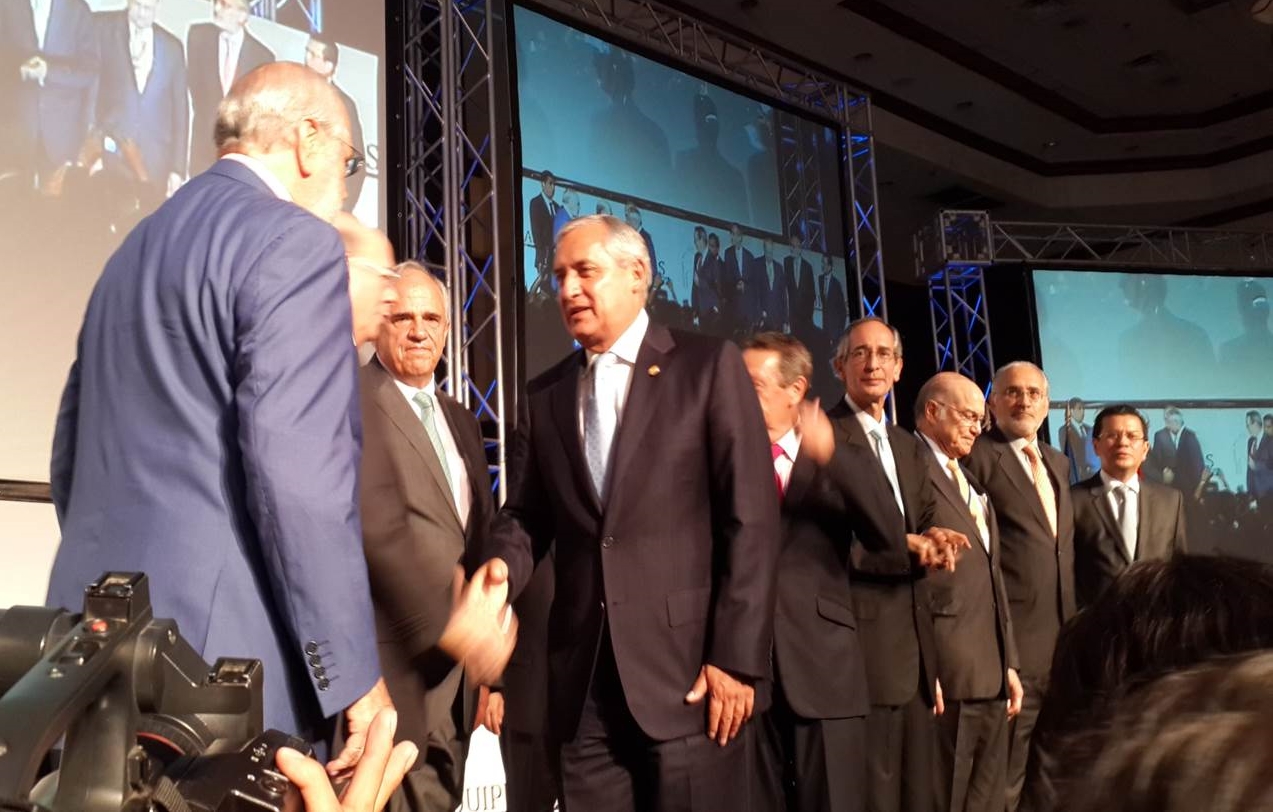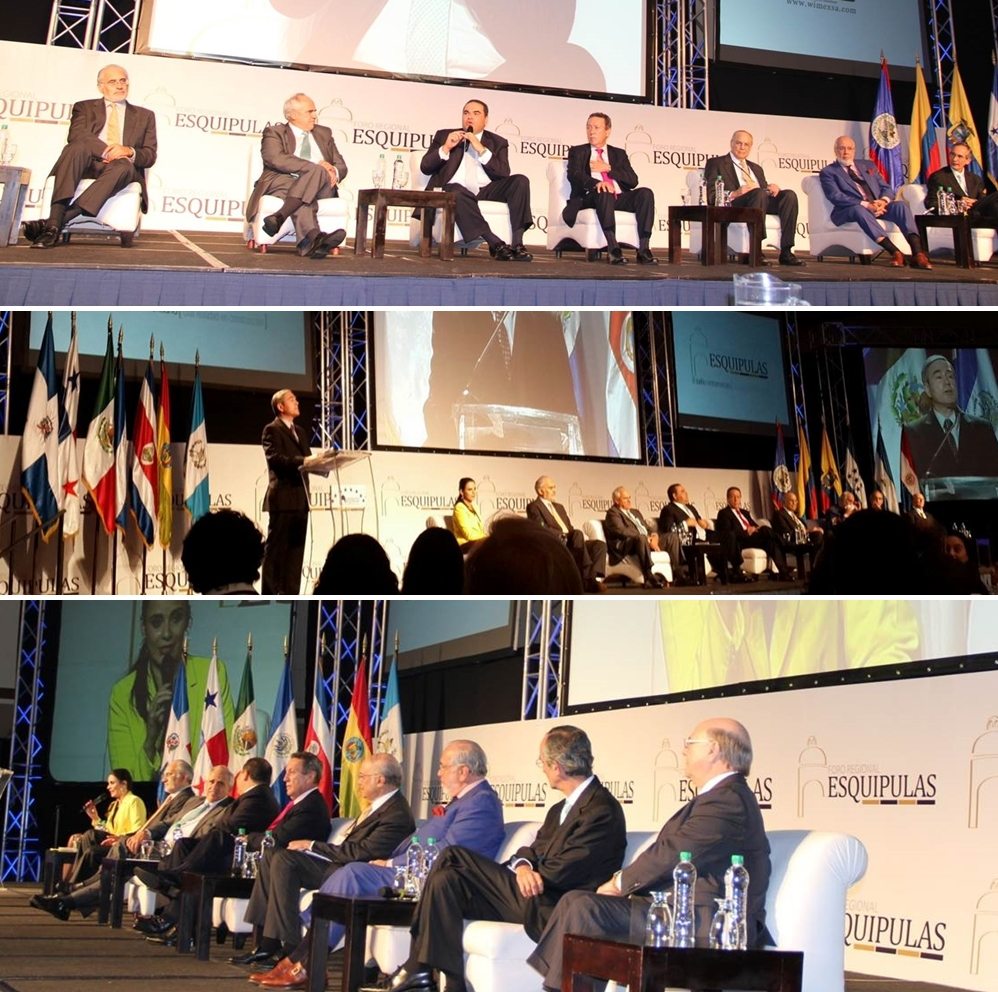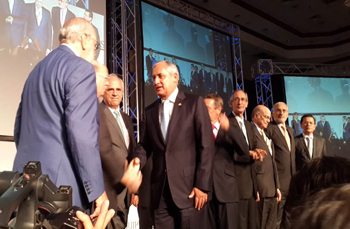
President Otto Perez Molina, of Guatemala greets members of the Latin American Presidential Mission.
On September 11, the 4th Esquipulas Regional Forum was hosted in Guatemala City. The forum entitled, “The Central American Dream: A Reality in Construction” was an in-depth discussion of challenges facing Central America.
The Esquipulas Foundation together with the Latin American Presidential Mission were the primary organizers. Co-conveners included the Ministry of International Relations and the Presidential Office of Guatemala, local and regional businesses, and NGOs including the Global Peace Foundation, Guatemalan Red Cross, think-tank IDPPS, and the National Leadership Conference of Uruguay.
Ms. Olinda Salguero, Director of Esquipulas Foundation, said of the forum, “This space is to promote the development of the region, democracy, peace and integration.” Nine former heads of state of the Latin American Presidential Mission, participated in the forum along with many other experts from fields such as human rights, education, and business.
The regional representative of the Global Peace Foundation for Latin America, Mr. Thomas Field, introduced the former presidents at the plenary entitled, “Strengthening Democracy and Integration for Latin American Development”, while the former president of Guatemala and founder of the Esquipulas Foundation, Dr. Vinicio Cerezo, called on forum participants to consider paths to move the process for integration of Central American forward. . “The models of development since 1994 have not resolved many of the issues that remain after the peace process, such as social problems and the equal inclusion of the people in the country’s wealth and welfare,” he said.

Top to bottom: Members of the Latin American Presidential Mission present at the 4th Esquipulas Regional Forum, former presidents: Carlos Mesa of Bolivia, Ernesto Semper of Colombia, Dr. Antonio Saca, of El Salvador, Vinicio Cerezo of Guatemala, Nicolás Ardito Barletta of Panama, Gustavo Noboa of Ecuador, and Alvaro Colom of Guatemala, Global Peace Foundation regional representative of Latin America introduces former presidents, Olinda Salguero, Director of the Esquipulas Foundation
The forum featured six panels addressing a wide-range of issues related to Central American development.
- Panel one addressed how to protect and raise youth to become active participants in nation-building. It also addressed issues of gender based violence, a major hindrance to development.
- The second and fifth panel discussed development opportunities through science, technology and a green economy. Panelists urged cross-sector cooperation, and innovation driven by a common regional vision.
- The third panel, entitled, “Peace, Democracy and Integration for Development” examined the progress that has been made in Central America since the Esquipulas Agreements I and II. While the region has seen a relative period of peace and democracy, there are still outstanding issues like impending conflicts and unequal access to development opportunities. Panelists took a closer look at how to forge ahead using assets like its geographical location and increased regional integration.
- The fourth panel took on a hot topic in Central America: justice and regional security in light of the ongoing battle against drugs. Dubbed the “North-Triangle” of Central America, El Salvador, Guatemala and Honduras have seen increasing drug activity. Drug activity has migrated there to avoid international surveillance in Mexico, Colombia and the Caribbean. The drug trade has had major adverse effects, from compromising rule of law, to affecting youth culture, and increased local violence. The panel examined concrete alternative to fighting the drug war.
- The sixth panel reframed the geopolitics of the region. Panelists recognized that improved transportation and communication technology has made the world a “global village. Recognizing the changing landscape allows for new opportunities for business and trade, regional cooperation and democratic participation.
The Latin American Presidential Mission (LAPM) continues to grow and expand since its launching at the 2012 Global Peace Convention in Atlanta. Each former president brings their particular experience and wisdom to the table. Staying true to its founding commitment, the LAPM focuses on the underlying universal principles and values when discussing hot topics concerning the American Hemisphere.

